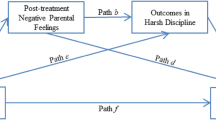Abstract
This study tested alternative hypotheses concerning relations between mothers' disciplinary dysfunction and their descriptive versus inference-level interpretations of child noncompliance. Mothers of aggressive boys (MAGGs; n = 19) and mothers of average boys (MAVGs; n = 17) were presented with hypothetical vignettes of compliance situations (mean ages; mothers = 26.8 years, children = 4.5 years). Each vignette ended with the child being compliant or with each of a variety of noncompliant behaviors (request, statement, complaint, ignore, or oppose). Dependent variables were mothers' judgments of noncompliance severity (a descriptive measure), and attributions of defiant intent to the child (an inferential measure). Findings across analyses consistently pointed to attributions as more discriminating than judgments in differentiating between maternal groups. It was concluded that models of maternal discipline dysfunction should focus on analysis of inferential rather than descriptive cognitive responses to child noncompliance, and that parenting interventions should incorporate attribution-training into treatment protocols.
Similar content being viewed by others
REFERENCES
Achenbach, T., & Edelbrock, C. (1981). Behavior problems and competencies reported by parents of normal and disturbed children aged four through sixteen. Monographs of the Society for Research in Child Development, 46(1, Serial No. 188).
Achenbach, T. M., & Edelbrock, C. (1986). Manual for the Teacher's Report Form and Teacher Version of the Child Behavior Profile. Burlington: University of Vermont, Department of Psychiatry.
Berkowitz, L. (1989). Frustration-aggression hypothesis: Examination and reformulation. Psychological Bulletin, 106, 59–73.
Bruner, J. S., Goodnow, J., & Austin, G. (1956). A study of thinking. New York: Wiley.
Bugental, D. B., Mantyla, S. M., & Lewis, J. (1989). Parental attributions as moderators of affective communication to children at risk for physical abuse. In D. Cicchetti & V. Carlson (Eds.), Child Maltreatment: Therapy and Research on the Causes and Consequences of Child Abuse and Neglect (pp. 254–279). New York: Cambridge University Press.
Bugental, D. B., Blue, J., & Lewis, J. (1990). Caregiver cognitions as moderators of affective reactions to difficult children. Developmental Psychology, 26, 631–638.
Bugental, D. B., Blue, J., Cortez, V.,, Fleck, K., Kopeikin, H., Lewis, J. C., & Lyon, J. (1993). Social cognitions as organizers of autonomic and affective responses to social challenge. Journal of Personality and Social Psychology, 64, 94–103.
Dix, T. (1991). The affective organization of parenting: Adaptive and maladaptive processes. Psychological Bulletin, 110, 3–25.
Dix, T., & Lochman, J. E. (1990). social cognition and negative reactions to children: A comparison of mothers of aggressive and nonaggressive boys. Journal of Social and Clinical Psychology, 9, 418–438.
Kenziora, K. T. (1995). Behavior tracking skills of mothers of problem and nonproblem toddlers. Unpublished manuscript, State University of New York at Stony Brook.
Lorber, R., Reid, J. B., & Simard, K. (1982). Maternal tracking of childhood behaviors as mediated by family stress. Paper presented at the annual meeting of the American Psychological Association, Los Angeles.
MacKinnon, C. E., Lamb, M. B., Belsky, J., & Baum, C. (1990). An affective-cognitive model of mother-child aggression. Development and Psychopathology, 2, 1–13.
MacKinnon-Lewis, C., Volling, B. I., Lamb, M. E., Dechman, K., Rabiner, D., & Curtner, M. E. (1994). A cross-contextual analysis of boys' social competence from family to school. Developmental Psychology, 30, 325–333.
Smith, A. M., & O'Leary, S. G. (1995). Attributions and arousal as predictors of maternal discipline. Cognitive Therapy and Research, 19, 345–357.
Strassberg, Z. (1995). Social information processing in compliance situations by the mothers of behavior-problem boys. Child Development, 66, 376–389.
Straus, M. A. (1979). Measuring intrafamily conflict and violence: The Conflict Tactics Scale. Journal of Marriage and the Family, 41, 75–88.
Straus, M. A. (1987). Measuring physical and emotional abuse of children with the Conflict Tactics Scale. Unpublished report, Family Violence Research Program of the Family Research Laboratory, University of New Hampshire, Durham.
Wahler, R. G., & Sansbury, L. E. (1990). The monitoring skills of troubled mothers: Their problem in defining child deviance. Journal of Abnormal Child Psychology, 18, 577–589.
Author information
Authors and Affiliations
Rights and permissions
About this article
Cite this article
Strassberg, Z. Levels of Analysis in Cognitive Bases of Maternal Disciplinary Dysfunction. J Abnorm Child Psychol 25, 209–215 (1997). https://doi.org/10.1023/A:1025795915802
Issue Date:
DOI: https://doi.org/10.1023/A:1025795915802




